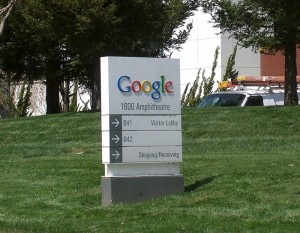
"Google is staking its claim in a near-future world where nearly every computing device will have its own eyes and ears." (Image by Coolcaesar.)
By focusing research and development on speech recognition, machine translation and computer vision, Google is looking to be the brand leader in the next epoch of search engines, in which there will be a supercomputer in your pocket capable of conducting searches that are light years smarter than the current ones. An excerpt from “Inside Google’s Age of Augmented Reality,” Wade Roush’s article in Xconomy:
“Here’s how [Eric] Schmidt put it in his speech: ‘When I walk down the streets of Berlin, I love history, [and] what I want is, I want the computer, my smartphone, to be doing searches constantly. ‘Did you know this occurred here, this occurred there?’ Because it knows who I am, it knows what I care about, and it knows roughly where I am.’ And, as Schmidt might have added, the smartphone will know what he’s seeing. ‘So this notion of autonomous search, the ability to tell me things that I didn’t know but I probably am very interested in, is the next great stage, in my view, of search.’
This type of always-on, always-there search is, by definition, mobile. Indeed, Schmidt says Google search traffic from mobile devices grew by 50 percent in the first half of 2010, faster than every other kind of search. And by sometime between 2013 and 2015, analysts agree, the number of people accessing the Web from their phones and tablet devices will surpass the number using desktop and laptop PCs.
By pursuing a data-driven, cloud-based, ‘mobile first’ strategy, therefore, Google is staking its claim in a near-future world where nearly every computing device will have its own eyes and ears, and where the boundaries of the searchable will be much broader. ‘Google works on the visual information in the world, the spoken and textual and document information in the world,’ says Michael Cohen, Google’s speech technology leader. So in the long run, he says, technologies like speech recognition, machine translation, and computer vision ‘help flesh out the whole long-term vision of organizing literally all the world’s information and making it accessible. We never want you to be in a situation where you wish you could get at some of this information, but you can’t.'” (Thanks Longform.)
Tags: Eric Schmidt, Wade Roush
